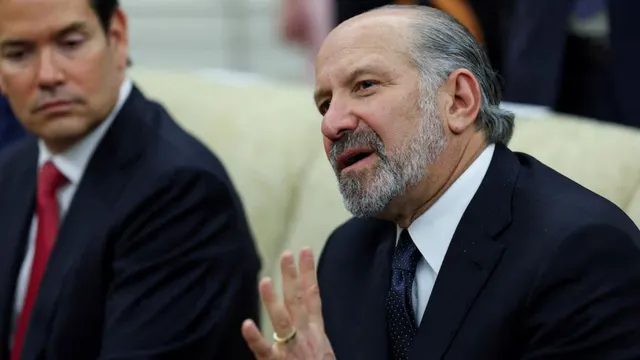- By Shivangi Sharma
- Sun, 14 Sep 2025 10:10 PM (IST)
- Source:JND
United States Commerce Secretary Howard Lutnick has sharply criticised India’s trade policies, warning that New Delhi could face “tough times” in doing business with the US unless it lowers its tariffs. His remarks came during a press conference on September 13, where he raised concerns about India’s limited purchases of US agricultural goods, particularly corn.
Lutnick argued that India, despite boasting a population of 1.4 billion, does not import even minimal quantities of American corn. “Why won’t 1.4 billion people buy one bushel of US corn? Doesn’t that rub you the wrong way that they sell everything to us and won’t buy our corn?” he said.
He accused India of maintaining high tariffs on US agricultural exports, calling the trade relationship “one-sided.” According to Lutnick, while the American market is open for Indian exports, US goods face barriers in India.
Trump’s Tariff Model
The secretary reiterated the stance taken by President Donald Trump, who pushed for reciprocal trade policies. “Bring down your tariffs, treat us the way we treat you,” Lutnick said, adding that Trump’s approach was aimed at correcting “years of wrong.”
The Trump administration previously imposed tariffs of up to 50 per cent on Indian goods, including a 25 per cent duty on New Delhi’s purchases of discounted Russian oil. Lutnick warned that unless India adapts, it will struggle to maintain smooth trade with “the world’s greatest consumer.”
Lutnick also accused India of blocking US businesses while expanding its own sales in the American market. “They sell to us and take advantage of us. They block us from their economy, and they sell to us while we are wide open for them to come in and take advantage,” he said.
He added that while India often portrays itself as a free-market democracy, its protectionist policie, particularly in agriculture, remain a major frustration for US businesses.
Strained Ties Over Tariffs
Lutnick’s comments come at a time when US-India relations have been strained over tariffs. Trump’s 25 per cent reciprocal duties on Indian goods, combined with another 25 per cent linked to Russian crude imports, have created one of the steepest tariff burdens in the world.
India has strongly criticised the levies as “unfair and unreasonable,” pointing out that Western nations themselves continue to import Russian oil. Despite the tension, Washington maintains that tariffs are necessary to ensure fair trade and to address longstanding imbalances in US relationships with major allies.

